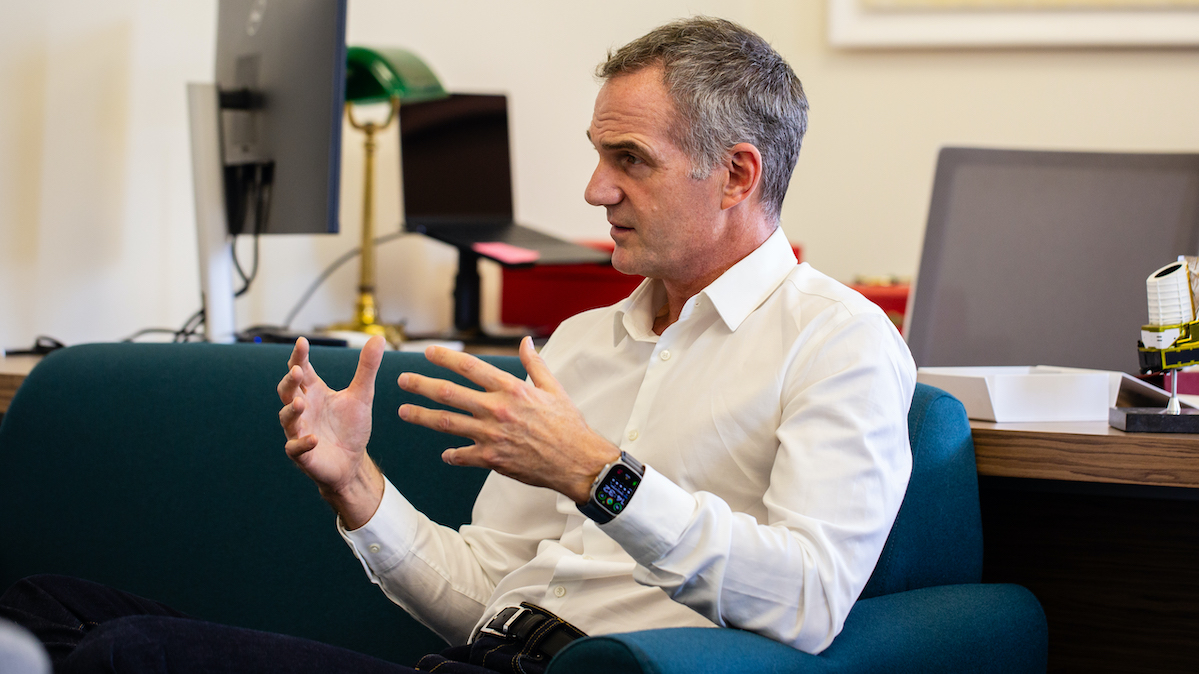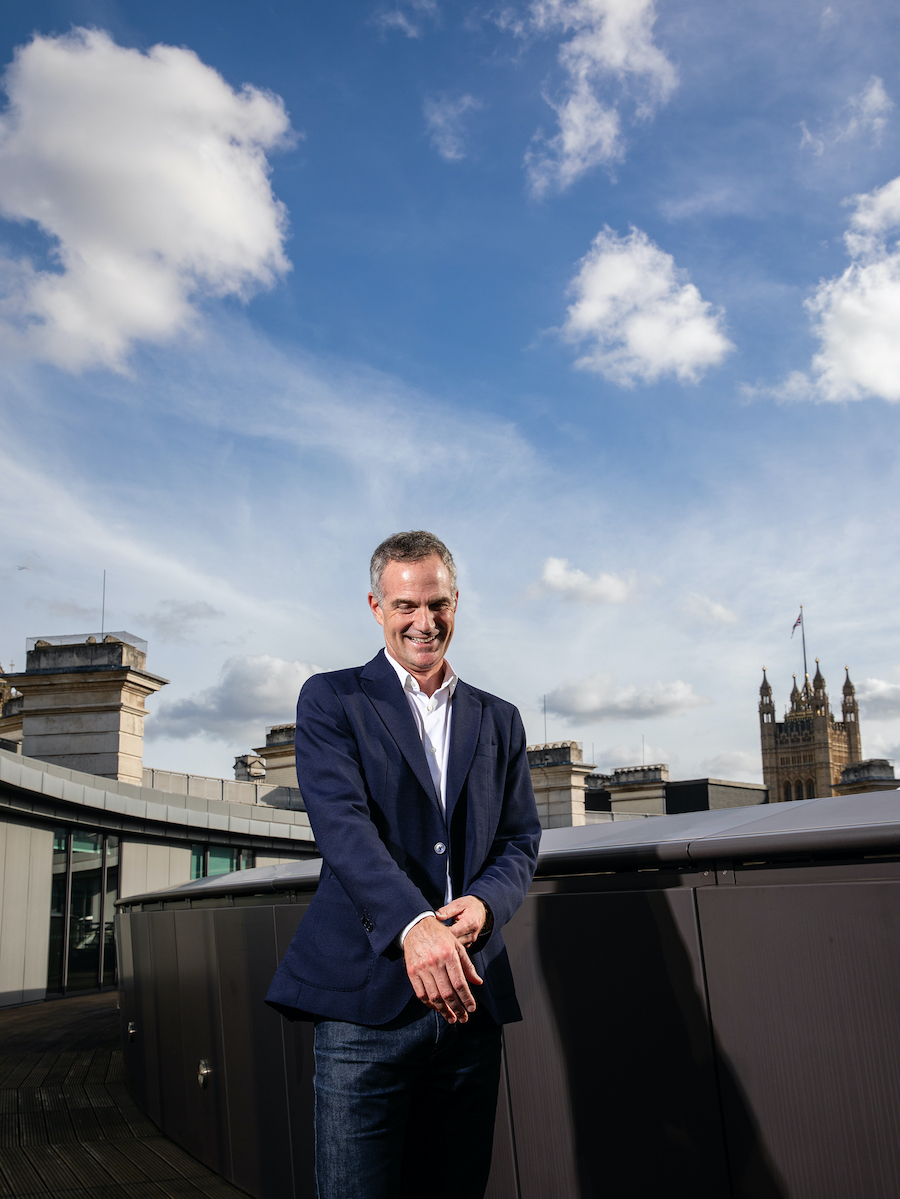Peter Kyle: 'I don’t wake up thinking, "Today is the day I’m going to speak to Elon Musk"'
Peter Kyle at the Department for Science, Innovation and Technology. Photography by Louise Haywood-Schiefer
9 min read
Ministers are banking on the AI revolution to drive everything from NHS reform to economic growth. Peter Kyle tells Tali Fraser about his efforts to keep the ‘Ferrari’ on the road. Photography by Louise Haywood-Schiefer
Peter Kyle is exhausted and exhilarated. “The job is the steepest learning curve that I’ve ever had,” says the Science Secretary. “It is totally unrelenting. There are two doors to this office. Usually, when one door opens and some people leave, the other door opens and people are coming in.”
Elon Musk is, as yet, not one of those people. The world’s most powerful tech entrepreneur was famously not invited to the UK’s investment summit in what was interpreted as a snub following his criticisms of the crackdown on this summer’s rioters and their online supporters.
But Kyle, 54, chooses not to escalate the spat with the self-proclaimed free speech champion, saying he remains in “awe of [Musk’s] achievements” and that he hopes one day to meet the man currently campaigning for Donald Trump. Even so the new Science Secretary makes clear that repairing the perceived breach is not his top priority.
“I have not ignored him but I don’t wake in the morning thinking, ‘Today is the day I’m going to speak to Elon Musk’.”
The uneasy relationship between the UK government and the entrepreneur is emblematic of a set of tensions between states and tech businesses that conditions much of politics in every country. Governments from London to Beijing want to extract the value of innovation while protecting citizens from harm and dealing with the consequences of disruption.
Kyle accentuates the positive – while acknowledging the risks. The Science Secretary has, for example, a striking description of how the government has brought digital services across departments and public services to create, what he brands “the most potent AI force that any government has access to”.
“We are creating an engine of reform,” Kyle says, “that will be the Ferrari of reform for the Prime Minister to drive.”
“My job is simply to get through each day, week and month, making as few mistakes as I possibly can, so the Ferrari doesn’t go off the track and end up in a ditch.”
To extend Kyle’s own metaphor, one thing that he clearly wants is a more responsive steering wheel. The Online Harms Act took five years to get through Parliament, and Kyle says it will likely be another 18 months before the guidance is fully issued. It is a clear example of what he says is the need for a “reflexive” regulatory environment.
.jpg)
“We can’t just have this big bang every seven or eight years when it comes to legislation, because it’s absurd.”
Kyle wants it to be known that technology companies’ presence in the United Kindgdom is not automatic but dependent on good behaviour: “I am setting the standards high for what we expect of companies who are here, working here and releasing products and having access to our society. It is a privilege to have access to our economy and society. It is not a right. That privilege has to be respected.
“It is the job of companies to make their products safe before they land in society. It shouldn’t be the job of government to pick up the pieces for poorly tested products.”
My job is simply to get through ... making as few mistakes as I possibly can, so the Ferrari doesn’t go off the track and end up in a ditch
He won’t be drawn on reports that he wants to revisit prohibitions on so-called ‘legal but harmful’ content that were stripped out of the legislation. He makes clear, however, that states like the UK will have to be constantly alert to emerging threats and be prepared to take tough action where necessary.
“I’m about the future, not the past,” Kyle insists, “and I think the online world is evolving very fast, so whereas some of the issues which are wrapped up in legal but harmful still exist, I think actually they’re evolving.”
He also makes clear that the corrections need not be legislative, saying that the argument against mobile phone use at school “is won”.
New Labour MP Josh MacAlister has put forward a Private Members’ Bill, guaranteed to have its Second Reading, which proposes banning smartphones.
“I think the argument on smartphones in schools is won. I don’t know of anyone who thinks it’s a good idea in schools now,” Kyle says supportively, but he is not keen on changing legislation.
“The guidance is working, so I don’t think we need to disrupt the direction of travel that we already have.”

But how should the government make its displeasure known when people in those positions of power in the tech industry don’t live up to those responsibilities?
“Everything is on the table. I’m not going to take anything off the table into the future,” the Science Secretary insists. “I mean, there is literally nothing I wouldn’t do to keep people, particularly young, potentially vulnerable people safe.”
The new minister’s default mode, however, is optimism. He stresses the personal benefits of technology assisted by artificial intelligence (AI) in managing his dyslexia.
“I understand why the simplicity of banning is seductive, but I don’t want to deny the opportunity that emerging technology offers to young people developmentally. Take me for example, I have quite profound neurological challenges, and AI is going to be incredible for kids who are growing up with the same challenges that I had growing up.”
Kyle faced issues at school because of his dyslexia, put into remedial classes and leaving without any qualifications. Even as an adult he has been assessed as having a reading age of just eight.
Having been written off by his teachers, he returned to school at 25, sat his A-levels and went to university, staying on to get a doctorate and working through the night to finish his thesis.
I take a very different view on free speech than Elon Musk does
The Science Secretary has integrated AI into his everyday life because of it. He often finds himself using the voice-to-text function of Siri, an intelligent assistant on iPhones, to dictate messages, especially when using words he struggles to spell.
“I’ll be walking down the street or with friends, and I’m replying to a text, and there’s just no way I’m going to get that word. It’s usually a very surprising word. It’s not logical and so I will sometimes just say one word to my Siri. My friends get a bit confused and ask, ‘Why are you saying this word?’ But it’s because I’m just trying to get that one word right, because I want to use that precise word in a message and precision might be important in that thing. It can be really annoying for me, often spell check can’t quite get to where I need to be.”
The disruption AI technology may cause the jobs market is, as yet, unknowable. UK graduates face the stiffest competition for jobs on record, with employers running graduate training schemes receiving an average of 140 applications for each job this year, 59 per cent more than in 2023, according to the Institute of Student Employers, supercharged by the use of artificial intelligence.
Kyle doesn’t exactly provide reassurance, but deploys humour to deflect. “I get asked all the time, ‘How is AI going to impact my sector, my job, society in general?’ I’ve had the privilege of sitting with the people who are creating the frontier models of AI, and not one of them has been able to tell me what their technology is going to be able to do in three months’ time.”
 What can be done, he says, is using “state to business” diplomacy to manage and engage over the impact of AI. Has the Science Secretary seen modelling over the potential effect on the job market and productivity? “I’ve seen lots, and every one is slightly different. The only thing that is consistent amongst every study I’ve ever read about professions that are going to be impacted is that politicians are always going to be needed.”
What can be done, he says, is using “state to business” diplomacy to manage and engage over the impact of AI. Has the Science Secretary seen modelling over the potential effect on the job market and productivity? “I’ve seen lots, and every one is slightly different. The only thing that is consistent amongst every study I’ve ever read about professions that are going to be impacted is that politicians are always going to be needed.”
Formerly the government’s chief scientific minister, now a DSIT minister, Lord Vallance is in the next door office. “He is always amazing,” Kyle says and has been helpful in getting to grips with the scientific knowledge.
The Science Secretary reveals a little of the courtship that led to one of Keir Starmer’s most striking appointments. Kyle had reached out to Vallance while in his shadow role “to sense check a whole bunch of things” with the then-scientific adviser.
What became a first meeting became a second, which turned into a series of regular meetings followed by “a very organic conversation about how it was so obvious that we saw eye to eye on what a potential programme of government could be”, which led to the “obvious conclusion” of Vallance joining the Labour government.
A number of his Labour Party colleagues have shared their intention to leave Musk’s X, formerly known as Twitter, with home office minister Jess Phillips branding it “a place of misery” and Jo Platt, MP for Leigh and Atherton, quitting the platform before the election. But Kyle won’t be joining them.
“If I stopped communicating with every outlet that gave me or the Prime Minister or the government abuse, I would be sitting in a dark room on my own for most of the day, and that’s not just online, that’s the media in general.”
“I take a very different view on free speech than Elon Musk does,” the Science Secretary adds, hitting out at the billionaire’s attitude to the issue. “Not that free speech isn’t important, because, my God, it is, these are the things that you die in a ditch over when it comes to upholding democracy, but free speech doesn’t mean having the right or the opportunity to harm others.”
He adds: “I think that’s where the conversation needs to be, not just with Elon Musk, but with many others."
